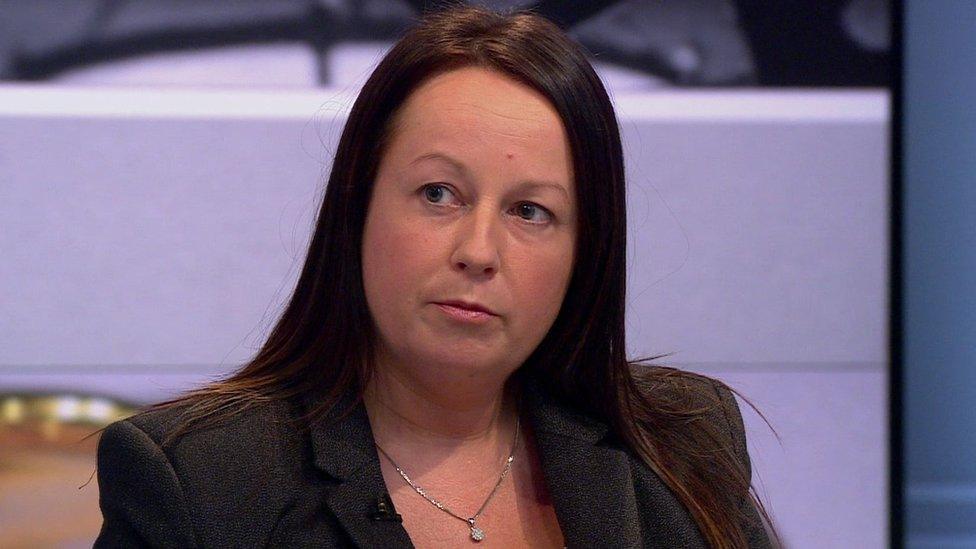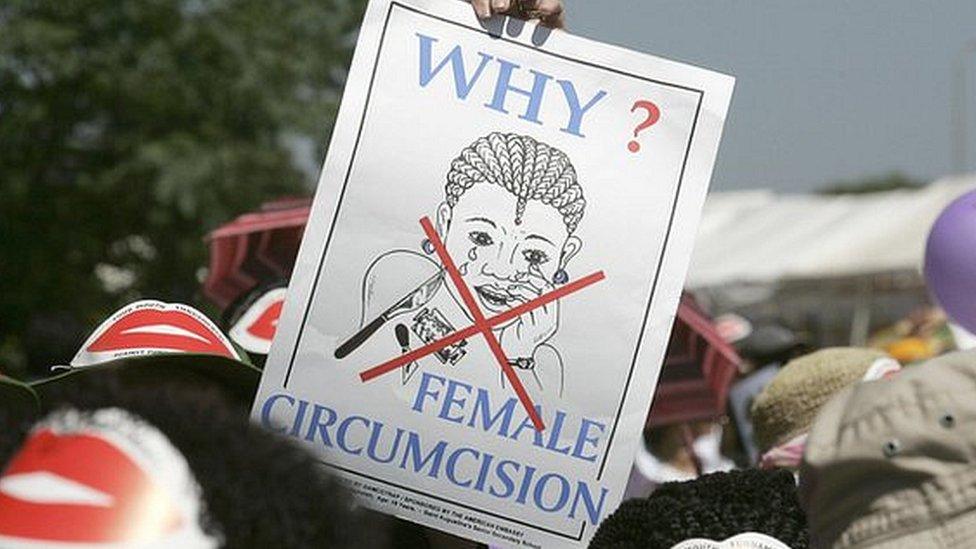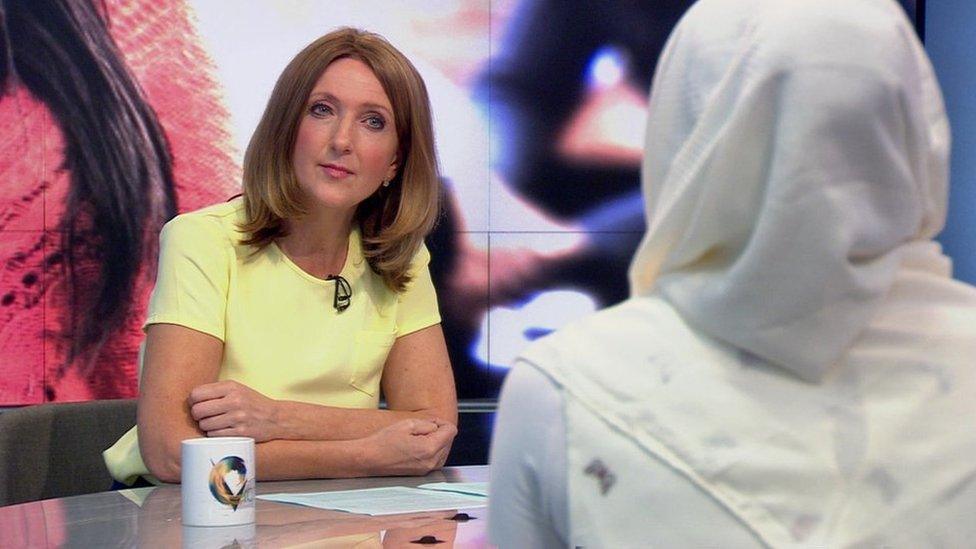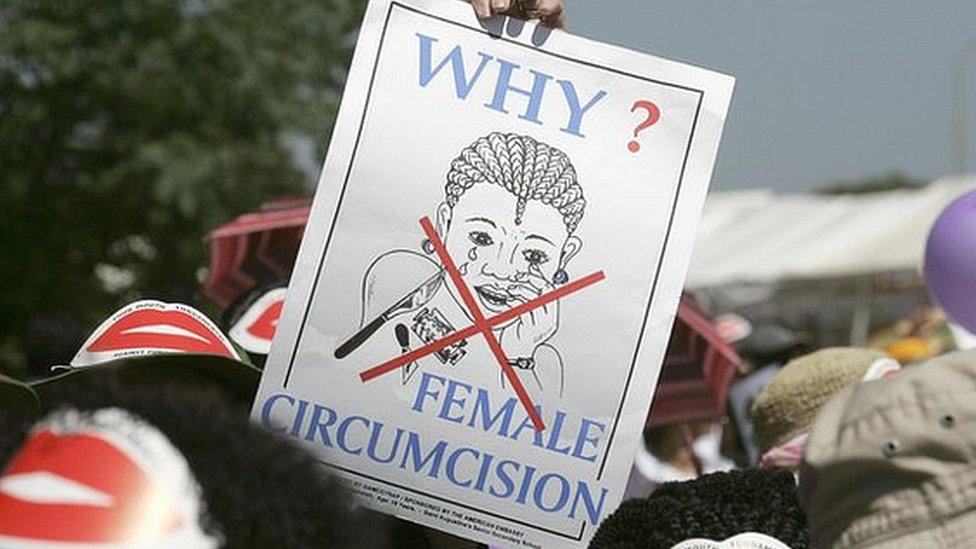The woman saved from her father's FGM plans
- Published
“Zara”: 'No-one would marry me unless I had FGM'
A woman from the West Midlands is the first person in the UK to be given a joint court order to protect her from both forced marriage and female genital mutilation. She tells her story.
"I was 17 when my father's family in South Asia first started telling him that I should be thinking about getting married," explains Zara - we have changed her name to hide her identity.
"An arranged wedding proposal came up that same year. I agreed the man would be a suitable match and we had talked online.
"We were fixing a date for the wedding when all of a sudden it was called off."
She later discovered the reason was that she had not undergone female circumcision - more commonly referred to in the UK as female genital mutilation (FGM).
Among the "traditional voices" within her father's community, she explains, FGM is often viewed as an expectation, and she was being labelled as "not respectable, not Muslim" for not having undergone it.
Her father had also begun to receive threats - including from family members - saying he was "not doing his job as a father" for allowing her not to have it.
This pressure grew over time, with other potential marriages falling through for the same reason. The fear of having to undergo FGM led Zara to develop mental health problems.
"It got to a point where I stopped eating. [I had] no hopes for my future. I fainted quite a few times," she says.
"My anxiety was at a peak. I wasn't able to stand still - I would shake, stumble."
By this time, the continued talk of FGM within the family had led Zara to view circumcision as "normal", and she thought she had little option but to go through with it if she wanted to marry.

Find out more
The Victoria Derbyshire programme is broadcast on weekdays from 09:00-11:00 on BBC Two and the BBC News Channel.

As a result, Zara booked an appointment to discuss FGM with her GP earlier this year, and was swiftly told the process was illegal. Zara was told to contact the NSPCC, who referred her to West Midlands Police.
Zara informed them that she believed she was at imminent risk of her father arranging a forced marriage - and that she could be taken abroad to undergo FGM.
The force assigned Zara two case workers. One of them, PC Jody Edwards, applied through a civil court to acquire the joint forced marriage and FGM protection order - the first of its kind in the UK - on her behalf, to ensure she would be safe.
Zara's father was questioned on FGM and forced marriage allegations, though he was not charged with any offences.

PC Jody Edwards applied for Zara's protection orders on her behalf
PC Edwards also provided emotional support for Zara.
"Every day I would make a phone call to her, to see how things were going and to update her, providing constant reassurance... that we could prevent FGM from happening," she says.
"Zara thought that she would have to stand up in court [and testify against her father]. But when I explained that I could do it, take all the information and apply to the courts on her behalf that [made a big difference]."

Female genital mutilation

Includes "the partial or total removal of the female external genitalia or other injury to the female genital organs for non-medical reasons"
Practised in 29 countries in Africa and some countries in Asia and the Middle East
An estimated three million girls and women worldwide are at risk each year
About 125 million victims estimated to be living with the consequences
It is commonly carried out on young girls, often between infancy and the age of 15
Often motivated by beliefs about what is considered proper sexual behaviour, to prepare a girl or woman for adulthood and marriage and to ensure "pure femininity"
Dangers include severe bleeding, problems urinating, infections, infertility and increased risk of childbirth complications and newborn deaths

Within "a week or two" of applying, the protection orders were granted. This ensured practical steps could be taken to protect Zara, such as the removal of her passport so she could not be taken abroad for FGM.
Zara says her father was also made to change his phone number and email address to prevent contact with those who might influence his views towards female circumcision.
Such FGM protection orders have existed in England, Wales and Northern Ireland since last July, with 32 being awarded by the end of 2015, according to Ministry of Justice figures.
The numbers have been criticised for being too low, with the National FGM Centre calling for professionals in contact with girls and women at risk to be "braver" in using them.
Forced marriage protection orders have existed since 2007, with 217 issued last year.
'Huge tension'
Over time, and with Zara's approval, the police have continued to work with her father to explain that it is illegal in the UK to force someone into a marriage or FGM.
Zara says this process is working, and she is still living at home with her father.
"It's been awkward, but I know it's the right thing," she says. "It's caused huge tension in my family, but we are trying to move forward. It was a big shock [for my father].
"I've been having therapy too. I'm studying now but suffer major anxiety."
But Zara also says - with a smile on her face - that she "feels safe, like I've got a new life".
She hopes her story will encourage others to come forward to police, and raise awareness. "I want people to know that FGM isn't just about Africa, it's happening all over, and the pressure is there on people."
- Published23 June 2016

- Published31 October 2015

- Published23 September 2015
